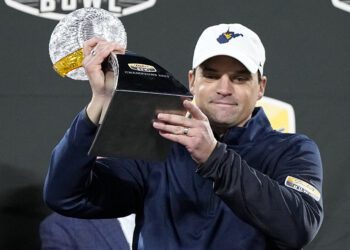As Princeton quarterback Chance Barker exited the locker room early in the week before the Tigers’ semifinal matchup with Bridgeport, head coach Keith Taylor asked him if he was ready to go. Barker quickly responded, assuring his head coach he was prepared for the task ahead.
Eight passing touchdowns and 503 yards later, it was evident he was true to his word. But prior to Taylor’s exchange with his QB, Barker had just finished meeting with offensive coordinator Chris Belcher.
Known to few outside the locker room, Belcher is largely credited with the success of Princeton’s turnaround over the last four seasons.
His offense has produced the school’s career leader in passing yards, touchdown passes and a first team all-stater in Grant Cochran as well as the 2020 Moss Award winner (given annually to the state’s top wide receiver) in Ethan Parsons with Barker and receiver Dominick Collins likely to replicate those feats this year.
Barker, a sophomore, has already shattered all of Cochran’s single-season records, entering the Super Six with 46 passing touchdowns to just two interceptions. Collins, with over 1,700 yards receiving, appears to be the Kennedy front runner (awarded annually to the state’s top player) and running back Marquel Lowe is just shy of 2,000 yards of total offense. Belcher’s unit is a well-rounded one that’s largely powered the Tigers to historic new heights, but it wasn’t always this way.
***
Belcher’s playing days saw him as the QB in a run-heavy wing-T system in the 2000s. He played alongside Taylor when the two were at Princeton together with Chris Pedigo, who coached the Tigers from 2017-22, serving as the team’s offensive coordinator. Despite a system that mostly kept the ball on the ground, Belcher was an exceptional passer
“In high school man, Chris could throw the ball with the best of them,” Taylor said. “The problem was in our scheme we only threw it seven times a game and the dude was still throwing for 165 yards and two touchdowns. He’ll still go out there every so often and throw the ball with Barker just to kind of show him how it’s done. And he throws a better ball than Barker or anybody out there.”
“He was one of the best passers that we had during that time in the early 2000s,” Pedigo said. “He held some records there early on. I think he threw for 1,300 yards. We had a 1,300-yard passer, a 1,300-yard rusher and I think T.J. Benners had like 800 yards receiving and we thought we were big time.”
Belcher’s talent eventually led to a shift his senior year.
“We were wing-T team and then my junior year coach Pedigo started opening it up a little bit more and we started to throw the ball a bit more,” Belcher said. “My senior year we were actually getting in shotgun sets more than we did my junior year, but yes, traditionally in a wing-T you typically throw it maybe 8-10 times a game.”
Belcher enrolled at Glenville State after high school where he learned enough about the spread offense to hook him. His tenure in Gilmer County lasted a year before transferring to Concord, bringing an end to his playing career.
From there he helped Ted Spadaro as an assistant coach before giving up coaching later after taking a job with Pepsi. He eventually got back into coaching in the 2010s, helping Larry Thompson rebuild the program at Mount View as the offensive coordinator.
“Mount View was my first job as an offensive coordinator,” Belcher said. “I coached for three years here with coach Spadaro from 2008-10 just as an assistant, but then when I went with Larry I had talked with him a little bit about his quarterbacks. He had a really good quarterback room and so I started to get involved with them just having conversations and working with them in the weight room and talking football. Next thing you know, Larry had asked me to coach. I wasn’t actually planning to but it just worked out that way and Larry basically just told me, ‘Hey, I’d like for you to keep the run game that we have in place but everything else, have at it.’
“I was starting from pretty much a completely blank slate. I had a little bit of familiarity with the spread because I was at Glenville. We were a spread team and I really liked the spread so it made good sense to me. I liked the strain that it puts on defenses. So I took a little bit Glenville’s because I knew some of the concepts that we were using here when I was playing. Coach Pedigo was my offensive coordinator but we use some of those concepts. We used some concepts that every spread team runs but the thing about Mount View was we didn’t have a super structure. You know, we did a lot but there was no clear system.”
When Pedigo took over as the head coach at Princeton in 2017, he asked Belcher to join him.
The offense wasn’t very good that year, scoring more than 20 just once in a 1-9 season that saw the Tigers operate out of the triple-option.
The following offseason Belcher and Pedigo decided to shift to the spread offense. While the Tigers finished 1-9 again, their offense improved and during a 52-20 loss at Wheeling Park, Pedigo turned the keys over to Belcher.
“We had a conversation in the office about switching to the spread before that season,” Belcher said. “I was in favor of that and coach Pedigo did some research and he found a system called the Nzone system and we bought some materials through them. We got really familiar with that and that’s kind of what we based all this off of. Now we still have several concepts and a lot of that same terminology, but we’ve progressed tremendously beyond that Nzone offense and just kind of personalized it to what our guys are good at, what we’re good at coaching and things that makes sense to us.
“Year after year we’ve continued to trim the fat and cut out things we’re wasting time on practicing. There’s been some concepts that may practice or you may install on Day 2 in August and at the end of the season you look back. We do self scouting to close up the season. Maybe you only ran this concept five times, but you practiced it every day. And so you trim fat a little bit, take stuff out and be careful about where you’re investing your time and your reps.”
After starter Ranson Graham got hurt in the second game of the 2019 season, Cochran, a freshman, stepped in and manned the spread attack. Princeton’s win total improved to just two, giving the Tigers four victories in Pedigo’s first three seasons.
It also marked the last time the Tigers didn’t make the playoffs with the system catching on. In 2020 they made their first trip back to the playoffs since 2015.
“We all learned together,” Pedigo said. “Since then when (Belcher) got the reins, I mean he’s just continued to develop that system. A lot of the bare bones of what they’re doing now is still what we did in 2018, ’19 and ’20 but he’s put a lot of wrinkles in it and he’s done this over the last few years, not just this year. When we had Ethan and he was calling the offense he learned from some of that stuff you know with just being able to move him around and use him in different places and be dynamic with him because he was a dynamic player. We learned we had to be able to do a little bit more than what we were able to do.”
***
In many ways that 2020 campaign laid the foundation for what the 2023 Princeton offense has become. Cochran threw 27 touchdown passes as a sophomore while Ethan Parsons set single-season program records with 49 catches for 870 yards and 12 touchdowns en route to winning the Moss Award. Josiah Honaker added 794 yards and 11 touchdown grabs opposite of Parsons while Amir Powell rushed for 1,090 yards and 17 scores.
It marked an era of unprecedented offensive success but also created a new problem for Belcher to solve – the bracket coverage. It was a minor setback that ultimately made Belcher’s offense better than before. The solutions have helped him counter the looks defenses currently present with Collins on the field. Even with brackets and occasionally three sets of eyes on Collins he’s still produced one of the best receiving seasons in state history.
“Ethan was probably where some of this unconventional defense stuff started,” Belcher said. “I can’t remember what team did it first but somebody came out and had a double team on Ethan. At that time, we really didn’t have anything in the offense to fix it. We kind of had to lose Ethan in that game that night because we didn’t have any way of getting him freed up from that. Once that started to happen we started to kind of build some things, whether it be motions, moving him here or moving him there. That’s where it started and then of course this offseason with Dom putting up the numbers he had with the WVU camp and whatnot we went into it figuring most teams are gonna probably try to play some type of bracket.
“I had to spend some time just thinking of how we can move him and how we can make it uncomfortable for you to plan to bracket. If we just sent him out here and you want to bracket all night where you can do that. But if on the next clip that you’re watching when you’re scouting, he’s here and he’s here, and he’s here and he’s here, now you’re gonna have to spend time all week coaching up who’s bracketing him when. How are you going to do it? If he’s here how are you gonna do this here? What if there’s a bracket and there’s motion? So we’ve tried to do enough to where you might be wasting your time and doing nothing but bracketing Dom.”
***
Having played QB himself, Belcher understands how to put his passers in the best position. It starts with the structure of the defense and making sure his QB understands what he’s seeing. There were times during Belcher’s playing days where he didn’t always feel as though he had the answers as the play clock ticked down and that’s a situation he doesn’t want to replicate with his players.
His approach has helped.
Since the start of the 2019 season, his QBs have thrown 137 touchdown passes with just 35 interceptions in 50 games. That’s nearly a 4-to-1 ratio. Cochran’s 15 interceptions as a freshman in 2019 accounted for a chunk of those.
It’s all in the preparation.
“I think the first thing that I work with quarterbacks on is defense,” Belcher said. “That maybe sounds crazy to some people because it’s an offensive position. But the first thing we talk about is defense because that’s where we’re gonna find our answers on Friday nights. They have to understand the offense but I want to teach them defense first so that when I start teaching the offense they can fall back on their knowledge of defense and how defenses work and how players are going to move. I want them to know how this particular play is going to plug into that defensive look. I try to teach them about the big picture thing but then we zero that into the most important information that we need. For example the quarterback comes out before he calls for the ball on the snap, and he’s gonna get a full picture of what the defense is doing. But by the time he calls for the snap, he’s down to one maybe two guys that he actually needs to make sure and verify what they’re going to do when he gets the ball.
Belcher’s process gives his QBs all the tools to succeed, even understanding what they’re seeing. He doesn’t force concepts or plays and occasionally changes his approach based on how his players see the defense. There aren’t always right or wrong answers and he takes that into account when calling plays, following the train of thought if it’s working.
“It’s making sure they’re prepared for how to run the offense and for what they can expect from the defense. At the same time we don’t want to overcomplicate things and give them a million things to think about because then they’re gonna play slow, they’re gonna play uncertain of themselves and bad things are gonna happen. In this offense we give them a lot of freedom. We run some more RPOs, and there’s times where Marquel might get the ball or Chance may run the ball or he may decide to throw the ball. Most of the time because I’ve coached him (Barker’s) going to do what I thought that he would do. There are times where I maybe thought the right choice is probably hitting this with Marquel but he decided to throw it out here to Dom. That doesn’t necessarily mean he was wrong. Before I jump down his throat about I want to understand his reasoning.
“I kind of adjust my thinking and my play calling to suit them. It’s just knowing the quarterback. Chance for example, we have pass concepts that he wasn’t very good at early on. They even ran them in middle school when they had him and he wasn’t very good at it. And so early in the season, we weren’t running them. Then we got to a point where I was like, ‘Hey, let’s introduce this back. Let’s start working it.’ You could tell he was unsure of it at first but we keep coaching him up trying to simplify how he’s going to read it and now it’s one of the best concepts that he executes. You’ve just got to find a way to make it a clear cut thing to where it becomes automatic, rather than them always having to think and process. They’ve got to have a plan and I tell them all the time, don’t ever call for the ball before you have a plan. And if whatever you’re seeing from the defense is confusing you and you’re not sure, call the timeout. We’ll burn one but you’ve got to have a plan. You have to know what you’re doing and what you’re looking at when you call for the ball.”
***
Belcher currently maximizes the most talented roster Princeton’s had during his tenure and has made the most of it. The Tigers have accumulated 5,544 yards of total offense, averaging 426.5 yards per game. The offense also averages 47.3 points per game, having scored under 40 just twice this season.
After a 73-point outburst against Bridgeport in which Barker broke the state preliminary round record for touchdown passes in a game with eight, Belcher’s offense will be on display for the whole state to see when the Tigers play Martinsburg in the Class AAA title game Saturday at noon at Wheeling Island Stadium.
It’s a fitting stage for the man whose head coach credits him for much of this historical season’s success.
“Chris is the best offensive coordinator in the state of West Virginia,” Taylor said. “I’ll take him over anybody else because that guy has put us in situations to be a really good football team when we didn’t have dudes like we do now. That’s no discredit to the guys that we had but Chris is such a great offensive coach that he can take average talent and make it exceptional. When you have really good talent across the board, not just here and there because we’ve had great kids over the years at Princeton, but now we have great kids at every spot, right? And I have nothing to do with the offense. Nothing. I ask Belcher what we’re doing and he tells me the game plan. You can ask all the other coaches especially coach (David) Campbell, like he’s the dude. He is the driving force behind our success. Offensively, he is the mastermind behind it. I am his biggest cheerleader.
“The only thing I do on the offensive handset is I switch over and give him compliments throughout the game. That’s it, and then they tell me to get off the offensive channel because I mess up their rhythm. So I get off and then I go back to the defense. But Chris, he’s a great friend of mine and I’m blessed and fortunate to have the opportunity to coach with him. I think if you’re talking about a Coach of the Year or whatever, it would definitely be Chris Belcher, right? I know I’m the head coach and all the credit and all the blame will go to me on wins and losses, but I can say the majority of our success is because of Chris Belcher.”
Email: tylerjackson@lootpress.com and follow on Twitter @tjack94









